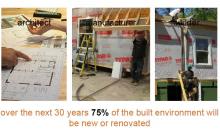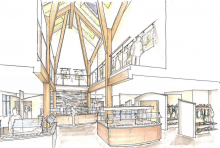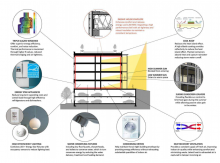Offsite Construction: the Future?
A panel of Architects and Manufacturers steeped in the offsite construction industry will discuss the future of offsite construction. Topics include the stigma of the industry itself in the US versus widespread successes overseas, challenges of the process within our current system, the truth behind perceived cost/speed/quality advantages, and the frank and current reality of it all.
Navigating Product Selection: How to Find the Greenest Materials in the Age of Full Disclosure
Are you drowning in the arcane alphabet soup of product labels? Frustrated with inflated environmental claims from manufacturers? Unsure of the health and safety risks associated with your favorite building materials? Help is on the way! Join the experts from BuildingGreen, who have been researching and writing about green building products for 25 years. In this hands-on half-day workshop, you will learn how to cut through the b.s. and select safer, greener products, and you’ll get an in-depth understanding of the trove of information you can find in product disclosure tools like environmental product declarations, health product declarations, and the newly required safety data sheets. Understand the full context, get down and dirty with the devil in the details, and learn which information you can safely ignore. You’ll also glimpse some of the newest, most innovative products that are paving the way for a greener future, and you will leave with powerful educational materials to share with clients and other team members. Bring your questions, share your insights, and get ready for an enlightening and entertaining morning!
Integrated Design for High Performance Schools
Schools provide complex puzzles for the architects and engineers who engage them. In this panel discussion, two high performance firms and their construction and engineering partners will discuss the challenges and rewards of decision-making in an educational environment, and the value of a fully integrated design process. At the Proctor Academy, the new dining hall’s energy target was Net Zero. The complex load profile – especially the all-electric kitchen and its extensive make-up air requirements, presented the design team with a hefty challenge. At the Friends School of Portland, architect and builder engaged with the school’s building committee to create a building to embrace the community’s values of Simplicity, Integrity and Stewardship, and managed to deliver Maine’s first Passive House school building.
Calculating the Life Cycle (Cradle to Grave) Impacts of Buildings
It is a tall order for humanity to become healers of the planet. In order to do so, people need to tap into new avenues of influence that are not yet sufficiently explored and identified. It is essential to lessen the environmental impacts of buildings in ways extending far beyond operational energy and carbon by considering a holistic view of material and energetic flows across a building’s full life cycle.At the same time we must consider how to give back to the planet and create a regenerative future. This workshop will demystify the important practice of life cycle assessment (LCA) and inspire with an overview of handprinting,which identifies how we not only do less harm, but change things for the better.
Participants will gain the skills needed to calculate the life cycle impacts of buildingsacross their full lifecycle – material production, transport and construction, material replacement and maintenance; and finally material disposal or re-cycling, and to use the results during the design process to evaluate design options and identify low-impact solutions. In the afternoon, participants will learn about the current state of the science of LCA practice, how to interpret and compare LCA results, and the integration of LCA into certification schemes, such as LEED and the Living Building Challenge. Presenters will share case studies in which LCA informed design decisions on built projects and participants will generate a series of comparative LCAs using Tally, a Revit-integrated LCA tool. Participants are encouraged to bring examples of material, assembly, or whole-building LCAs and their thoughts and questions about this emerging practice.
Getting to Zero: Frameworks & Roadmap to help you achieve portfolio-wide performance improvements
The future of our planet and our profession depend on our ability to co-create collaboratively and achieve levels of synergy that transform our impact. Net Zero, the 2030 Challenge and LEED define performance targets. Yet, critical gaps remain between rising performance goals and the organizational capability to consistently achieve them. AIA 2030 data shows that 57% of gsf uses energy modeling, meaning 43% doesn’t. Most teams don’t know what the anticipated energy use is. Firms also report that LEED certified projects, which tend to have more commitment and higher levels of integration, have 24% lower pEUI than non-LEED projects, yet LEED still represents a small percentage of a firm’s portfolio. This session provides participants with frameworks and proven methodologies to transform their practice from “random acts of sustainability” to consistent capability based on cultural change, clearly articulated methodologies, truly integrative design and effective use of metrics to achieve continuous improvement.
Can You Afford an SPF Failure? A Comprehensive Look at Assuring a Quality Foam Installation
As a building professional you take on a high level of risk when you use spray foam in your projects. Spray foam is the one of the few building materials we routinely use that is manufactured on-site; yet it is almost always installed without adequate quality control or the means to verify proper processing; and the consequences of material failures and/or inadequate protection of the occupants and the site can be catastrophic. That’s the bad news. The good news is that you can minimize the risks if you know what to require from installers and how to ensure that they use the proper safety protocols and quality control. This must-attend workshop will teach you everything you need to know and do to avoid problems with spray foam installations.
Huddle Together for Warmth: Multiple Solutions for Multifamily Passive House
We will show two mid-rise multi-family projects in the northeast that meet either the Passive House or PHIUS+ building energy standard. The Distillery’s 28-unit Phase 1 building in South Boston, MA and the Bayside Anchor 45-unit project in Portland, ME, both now under construction, will be used to discuss the design and construction principles that are employed to radically reduce energy consumption and construct beautiful, low energy, and healthy urban living spaces. Details, testing data and lessons learned will be shared with a special focus on large scale air barrier implementation, efficient ventilation systems, and cost savings and funding metrics.
Affordable Passive House Commercial Buildings - Secrets Revealed
High performance commercial buildings cost 10- 25% more to build than conventional buildings, right? Adam Cohen of Passiv Science has been designing and building high performance commercial buildings at costs comparable to typical new construction and achieving Passive House level results. This workshop will explain the basics of Passive House design principles specific to commercial buildings. It will then go into the details of how buildings like dental clinics and college dormitories can be built at market rate while achieving Passive House standards. Integrated Project Management will be discussed as will details, equipment, controls and areas for capturing money typically left on the table in conventional design-bid-build project delivery situations.
Building Blocks for Green Master Planning: A Hands-on Introduction to LEED ND
This engaging, hands-on workshop will give participants a “learning by doing” introduction to sustainable site planning principles and USGBC’s LEED for Neighborhood Development program. The workshop will begin with a short introduction. Then, using case studies developed from actual site designs, participants will complete a series of guided exercises in small teams to develop their own plans for these sites using wooden building blocks on top of the case study site plan. Teams will test development feasibility, do site design, and apply LEED ND credits to their plans. By comparing the workshop team designs and considering the actual plans, participants will explore the many ways that sustainable design principles can be applied to site planning. Teams will also gain experience with applying LEED ND prerequisites and credits to their site plans. This workshop is designed for participants of all skill levels—no prior design or planning experience needed
Sketching with Numbers
It’s about time we stop ignoring the full impact that design, construction and development really have. We cannot stop at net zero operational energy but instead need to consider all of the aesthetic, carbon, embodied energy, community, and financial impacts of work. No one ever said socially and environmentally responsible development would be easy, but that doesn’t mean it is impossible. This workshop will look at how Placetailor incorporates quantitative analysis into the design phase of small-scale residential development work to create dwellings that are architecturally interesting and super insulated, have lower embodied carbon, are located in urban infill and are based on an integrated analysis of finances and energy. This is a workshop about raising the bar, exploring the idea of a “net positive impact”, and getting hands-on experience using the Placetailor developed “Gizmo”, a spreadsheet tool that converts these conceptual inklings into practical analysis.



